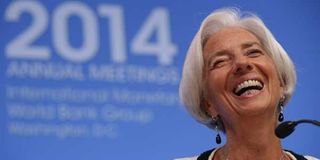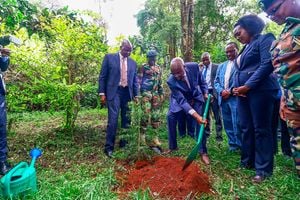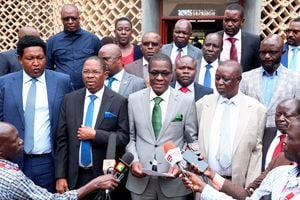Kenya secures IMF financing plan to help stabilise teetering shilling

International Monetary Fund (IMF) Managing Director Christine Lagarde holds a news conference during the International Monetary Fund-World Bank Group annual meeting October 9, 2014 in Washington, DC. Kenya has secured commitment from the IMF for additional loan to help stabilise the shilling in face of huge import of construction materials for the new railway line and oil exploration. PHOTO | AFP
What you need to know:
- According to the lender, the funding will secure financing of the standard gauge railway project and other development initiatives launched by the government.
- IMF said the railway project will boost integration of the East African region, while reducing transport costs significantly and subsequently cutting the cost of doing business.
Kenya has secured commitment from the International Monetary Fund for additional loan to help stabilise the shilling in face of huge import of construction materials for the new railway line and oil exploration.
This follows successful discussions held between the Bretton Woods Institution and government officials last week.
“The mission and the Kenyan authorities reached staff level agreement on an economic programme that could be supported by stand-by arrangement and stand-by credit facility, which the authorities intend to treat as precautionary,” noted a statement released by the IMF.
“This arrangement would serve an insurance purpose, providing Kenya with access to IMF resources in the event of exogenous shocks,” it added.
The agreement now awaits approval of the IMF executive board that is expected by end of January 2015.
The loan granted under the stand-by arrangement and stand-by credit facility (SBA/SCF) will only be drawn in case of the shilling weakening threatening economic stability.
According to the lender, the funding will secure financing of the standard gauge railway project and other development initiatives launched by the government.
This is expected to remove hurdles to growth, while reducing vulnerabilities and preserving a sustainable debt position.
GROWTH COMMENDED
The global lender lauded Kenya’s economic growth noting that the projects being implemented are set to accelerate the country’s growth.
“Kenya’s economy remains robust, supported by strong credit growth and a dynamic investment environment. Inflation has declined in the last two months and remains within the government’s target range.”
The lender said the gradual depreciation of the shilling mostly reflects developments in global currency markets, adding that international reserves stand at 4.9 months of prospective import coverage.
This was boosted by proceeds from the successful issuance of sovereign bond in June 2014.
“Investment in power generation, in particular in geothermal energy, is already translating into lower electricity costs for firms and households. However, difficult security conditions are having a dampening effect on the tourism sector.”
BOOST INTERGRATION
IMF said the railway project will boost integration of the East African region, while reducing transport costs significantly and subsequently cutting the cost of doing business.
“The standard gauge railway’s initial construction work will contribute to higher real Gross Domestic Product growth, projected to rise to 6.9 per cent in 2015 from 5.3 per cent in 2014.”
The lender said import of the new railway’s construction equipment, which coupled with continued investment in oil exploration is expected to keep the external current account deficit relatively high at around 8.5 per cent of the country’s GDP in 2015.
It added that the government was committed to containing the wage bill over the medium term to improve on development spending, while enhancing tax collection efforts.





